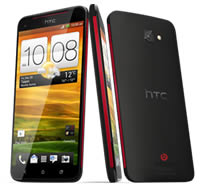Difference between HTC Butterfly and HTC First
Key difference: The HTC Butterfly is a high-end phone by the HTC Corporation. The HTC Butterfly is sold in four variants: Droid DNA; J Butterfly HTL21; Butterfly X920d; and Butterfly X920e. They are all powered on a Quad-core 1.5 GHz Krait processor. The HTC Droid has the Quadcomm MDM615m, while the Butterfly variants have the Qualcomm APQ8064 chipset. They all have 2 GB of RAM. HTC First is the first phone that will be released running on the Facebook Home user interface. The phone will be powered by a Qualcomm MSM8930 Snapdragon 400 1.4 GHz Dual-core Krait and a 1 GB of RAM.
 The HTC Butterfly is a high-end phone by the HTC Corporation. The phone has been quite popular all over the world; however, most people don’t know exactly how popular the phone has actually been. This is mainly because not many people know that the HTC Butterfly and HTC Droid DNA is actually pretty much the same phone, with only a few differences. The differences are only there to make the phone more regional specific.
The HTC Butterfly is a high-end phone by the HTC Corporation. The phone has been quite popular all over the world; however, most people don’t know exactly how popular the phone has actually been. This is mainly because not many people know that the HTC Butterfly and HTC Droid DNA is actually pretty much the same phone, with only a few differences. The differences are only there to make the phone more regional specific.
The HTC Butterfly is sold in four variants: Droid DNA in the United States on the Verizob Network; J Butterfly HTL21 in Japan on KDDI's au network; Butterfly X920d in Taiwan, South East Asia and India; and Butterfly X920e in China and Russia.
All the variants have most of the same features. They are all powered on a Quad-core 1.5 GHz Krait processor. The HTC Droid has the Quadcomm MDM615m, while the Butterfly variants have the Qualcomm APQ8064 chipset. They all have 2 GB of RAM and Adreno 320 graphics processor. They all have an 8 MP primary camera and a 2.1 MP secondary front facing camera. The display is a 5 inch Super LCD3 capacitive touchscreen with Corning Gorilla Glass 2. At the time of the launch the phone was the second phone in the market to feature a 1080p display. The phone has Android version 4.1, but is upgradable to Android 4.2.
The HTC Droid DNA differs from the other variants, in that it supports wireless charging, but lacks a MicroSD slot. The Droid DNA and the J Butterfly both support CDMA and LTE connections, as well as UMTS. However, only the Droid DNA comes with quad band UMTS radio. The X920d and X920e, on the other hand, do not even have LTE support. There are also some subtle differences regarding color accents, buttons and logo placement. However, these are minor and so not affect the phones.
HTC First is the first phone that will be released running on the Facebook Home user interface. This isn’t the first time that HTC and Facebook have collaborated. HTC has previously launched the ChaCha, Status, and Salsa, all of which had special Facebook integration, beyond the normal app. However, the HTC First will be the first to actually have a user interface (UI) based on Facebook.
 The Facebook Home UI will consist of Cover Feed which will use the home screen and lock screen to show content posted by friends on Facebook, as well as notifications from other apps. It also has an overlay over any and all apps, which allow users the ability to message others via Facebook or SMS, without leaving the app. The lock icon on the lock screen will show the profile picture of the user.
The Facebook Home UI will consist of Cover Feed which will use the home screen and lock screen to show content posted by friends on Facebook, as well as notifications from other apps. It also has an overlay over any and all apps, which allow users the ability to message others via Facebook or SMS, without leaving the app. The lock icon on the lock screen will show the profile picture of the user.
The HTC First also offers the users the ability to turn off the Facebook Home UI, in case they choose to. When Facebook Home is disabled, the phone will revert to stock Android, in this case Android 4.1 Jelly Bean. The phone will also be the first smartphone to include Instagram, recently-acquired by Facebook, as a pre-loaded app.
The phone will be powered by a Qualcomm MSM8930 Snapdragon 400 1.4 GHz Dual-core Krait and a 1 GB of RAM. The phone will come with as in-built memory of 16 GB and no external memory. The phone also has an embedded Li-Po 2000 mAh battery.
The phone has a 4.3 inch Super LCD capacitive touchscreen with a resolution of 720 x 1280 pixels. The primary camera on the phone is a 5 MP with BSI sensor and a 1.6 MP front-facing secondary camera, also with BSI sensor.
The information for the detailed table about the two phones has been taken from the HTC website, engadget.com, theverge.com and GSMarena.com.
|
|
HTC Butterfly (HTC Droid DNA) |
HTC First |
|
Launch Date |
November 2012 |
April 2013 |
|
Company |
HTC |
HTC |
|
Size |
143 x 70.5 x 9.1 mm (5.63 x 2.78 x 0.36 in) |
126 x 65 x 8.9 mm (4.96 x 2.56 x 0.35 in) |
|
Display |
Super LCD3 capacitive touchscreen, 16M colors |
Super LCD capacitive touchscreen, 16M colors |
|
Screen |
1080 x 1920 pixels, 5.0 inches (~441 ppi pixel density) |
720 x 1280 pixels, 4.3 inches (~342 ppi pixel density) |
|
Protection |
Corning Gorilla Glass 2 |
- |
|
Weight |
141.7 g (4.97 oz) |
123.9 g (4.34 oz) |
|
2G Network |
GSM 850 / 900 / 1800 / 1900 or CDMA 800 / 1900 |
GSM 850 / 900 / 1800 / 1900 |
|
3G Network |
HSDPA 850 / 900 / 1900 / 2100 or CDMA2000 1xEV-DO |
HSDPA 850 / 900 / 1900 / 2100 |
|
4G Network |
LTE 700 (market dependent) |
LTE 850 / 1900 |
|
GUI |
HTC Sense UI 4+ |
Facebook Home UI |
|
CPU speed |
Quad-core 1.5 GHz Krait |
Dual-core 1.4 GHz Krait |
|
GPU |
Adreno 320 |
Adreno 305 |
|
OS |
Android OS, v4.1 (Jelly Bean), planned upgrade to v4.2 (Jelly Bean) |
Android OS, v4.1 (Jelly Bean) |
|
Chipset |
Qualcomm Snapdragon MDM615m or APQ8064 |
Qualcomm MSM8930 Snapdragon 400 |
|
RAM |
2 GB RAM |
1 GB LPDDR2 |
|
SIM Size |
Micro-SIM |
Micro-SIM |
|
Internal Memory |
16 GB (11 GB user available) |
16 GB |
|
Expandable Memory |
microSD, up to 32 GB (Market dependent) |
No |
|
Sensors |
Accelerometer, gyro, proximity, compass |
Gyro sensor, Tri-axis Accelerometer, Proximity sensor, Ambient light sensor |
|
Connectivity |
3.5 mm stereo audio jack, NFC capable, Compliant with Bluetooth 4.0 BLE, Wi-Fi: 802.11 a//b/g/n, micro-USB 2.0 (5-pin) port |
3.5 mm stereo audio jack, NFC capable, Compliant with Bluetooth 4.0 BLE, Wi-Fi IEEE 802.11 a//b/g/n, micro-USB 2.0 (5-pin) port |
|
Data |
GPRS, EDGE, WLAN, Bluetooth, USB, NFC (Market dependent). |
GPRS, EDGE, WLAN, Bluetooth, USB, NFC |
|
Speed |
HSPA, EV-DO Rev. A, up to 3.1 Mbps; LTE, Cat3, 50 Mbps UL, 100 Mbps DL |
HSDPA, HSUPA |
|
WLAN |
Wi-Fi 802.11 a/b/g/n, Wi-Fi Direct, DLNA, Wi-Fi hotspot |
Wi-Fi 802.11 a/b/g/n, dual-band, Wi-Fi hotspot |
|
Bluetooth |
Yes, v4.0 with A2DP |
Yes, v4.0 with A2DP, LE |
|
USB |
Yes, microUSB v2.0 (MHL) |
Yes, microUSB v2.0 |
|
Primary Camera |
8 MP, 3264x2448 pixels, autofocus, LED flash |
5 MP, 2592x1944 pixels, autofocus, LED flash |
|
Secondary Camera |
2.1 MP, 1080p@30fps |
1.6 MP BSI front camera (ultrawide angle) |
|
Video |
1080p@30fps, stereo sound rec., video stabilization |
1080p Full HD video recording |
|
Camera Features |
Simultaneous HD video and image recording, geo-tagging, face and smile detection, autofocus, LED flash |
BSI sensor, F2.0 aperture and 28 mm lens, Auto focus, LED flash, Geo-tagging, touch focus, face detection |
|
Sound Enhancement |
Built-in headset amplifier and dedicated amp for the external rear-speaker, Beats Audio |
Active noise cancellation with dedicated mic, Speaker with built-in amplifier IC (support 2.55V) |
|
Audio supported formats |
MP3/eAAC+/WMA/WAV player |
.aac, .amr, .mp3, .wav, .wma (Windows Media Audio 9) |
|
Video supported formats |
DivX/XviD/MP4/H.263/H.264/WMV player |
MP4/H.263/H.264/WMV player |
|
Battery Capacity |
Non-removable Li-Ion 2020 mAh battery |
Embedded rechargeable Li-Po 2000 mAh battery |
|
Stand-by |
Up to 353 h |
- |
|
Talk time |
Up to 12 h 40 min |
- |
|
Available Colors |
Black |
Black, Black/White, Black/Blue, Black/Red |
|
Messaging |
SMS (threaded view), MMS, Email, Push Email |
SMS (threaded view), MMS, Email, Push Email |
|
Browser |
HTML5 |
HTML5 |
|
Radio |
- |
- |
|
GPS |
Yes, with A-GPS support and GLONASS |
Yes, with A-GPS support and GLONASS, Digital compass |
|
Java |
Yes, via Java MIDP emulator |
Yes, via Java MIDP emulator |
|
Additional Features |
|
|
Image Courtesy: htc.com









Add new comment